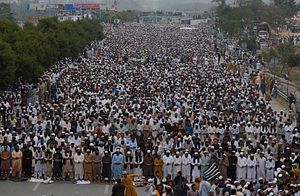Tens of thousands of members of a radical Islamist party camped out in Pakistan’s capital overnight, demanding Friday the resignation of Prime Minister Imran Khan over economic hardships.
Leading a caravan of hundreds of cars and buses was Maulana Fazlur Rehman, the leader of the Jamiat Ulema-e-Islam party. He began his “Azadi March” from the southern city of Karachi last Sunday.
Rehman and his supporters entered Islamabad at about midnight Thursday. Chanting slogans for change and waving party flags, they camped out at an open area allocated for them by the government amid tight security.
The hard-line religious cleric who has campaigned for regressive legislation targeting women and opposed legislation to eliminate of violence against women denied female journalists access to his march, causing a social media storm. Rehman also refused to allow women members of his party to participate in his march.
Rehman has been accusing the military of influencing the 2018 parliamentary elections that saw Khan’s Pakistan’s Tehreek-e-Insaf party come into power. Rehman’s seven-party political alliance, Muttahida Majlis-e-Amal, could secure only 16 seats in the 342-member National Assembly, the lower house of parliament. Khan received 155.
Khan on Friday told a gathering in the northern city of Gilgit that he was not afraid of Rehman’s threats to his government. He said opposition parties under the leadership of Rehman had entered Islamabad with their supporters to call for accountability.
“I will continue to hold the corrupt accountable,” he said.
Authorities have deployed police and paramilitary forces and put shipping containers on key roads in the capital to prevent the massive anti-government procession from reaching the Red Zone, where government offices, parliament, and foreign embassies are located.
The rally comes two days after Pakistani businesses observed a nationwide strike against recently imposed taxes, which the opposition says were imposed as part of the International Monetary Fund’s $6 billion bailout package for Pakistan.
Khan insists he is taking measures to improve the economy. But his political opponents want immediate fresh elections, saying Khan’s government is creating more problems for the life of the common man.
Rehman, in a fiery speech to demonstrators Friday night, vowed to continue his protest until Khan steps down. He said Khan is the most incompetent ruler in the country’s political history and that his ouster is necessary for saving Pakistan and saving people from more hardship.
He said his rally was peaceful, but claimed his supporters had the capability to remove Khan from power by entering his official residence. He also asked the country’s military to remain neutral because “we don’t want any confrontation with the institutions.”
Rehman, without naming the army, said he wants the country’s “powerful forces” to end their support for Khan’s government “in the next two days.”
Almost all of Pakistan’s main political parties have extended their symbolic support of Rehman’s rally by joining him in anti-government speeches.
Bilawal Bhutto Zardari, leader of the Pakistan People’s Party, told one of the largest rallies in Islamabad’s recent history that they will wage a joint political struggle to force Khan to resign. He called Khan a “puppet ruler.”
Shahbaz Sharif, who heads the Pakistan Muslim League party, promised in a speech to improve the country’s economy within six months if his party comes into power in future after removal of Khan’s government.
Pakistan’s opposition says Khan came into power because of the support of “unseen forces” — a reference to the country’s powerful military, which has denied supporting any political party in the 2018 parliamentary elections.
Since Khan came to power, there has been a crackdown, mostly enforced by the military and its powerful intelligence service, against anyone who criticizes their actions.
By Munir Ahemd for The Associated Press. Associated Press writer Kathy Gannon contributed to this report.

































